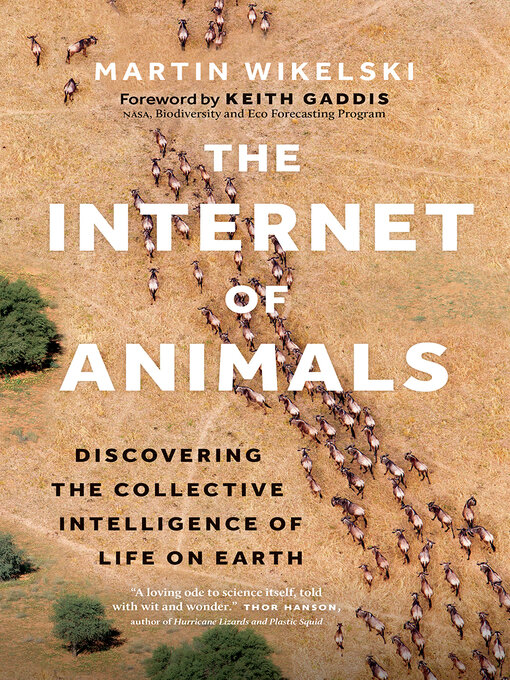The Internet of Animals
Discovering the Collective Intelligence of Life on Earth
An illuminating account of animal migration and the stunning new science that reveals their infinite, untapped knowledge.
"A loving ode to science itself, told with wit and wonder."—Thor Hanson, author of Hurricane Lizards and Plastic Squid
What do animals know that we don't? How do elephants detect tsunamis before they happen? How do birds predict hurricanes? In The Internet of Animals, renowned scientist Martin Wikelski convincingly argues that animals possess a unique "sixth sense" that humans are only beginning to grasp ...
All we need to do is give animals a voice and our perception of the world could change forever. That's what author Martin Wikelski and his team of scientists believe, and this book shares their story for the first time. As they tag animals around the world with minuscule tracking devices, they link their movements to The International Space Station, which taps into the 'internet of animals': an astonishing network of information made up of thousands of animals communicating with each other and their environments. Called the International Cooperation for Animal Research Using Space, or ICARUS, this phenomenal project is poised to change our world.
Down on the ground, Wikelski describes animals' sixth sense first-hand. Farm animals become restless when earthquakes are imminent. Animals on the African plains sense when poachers are on the move. Frigatebirds in South America depart before hurricanes arrive ...
As Wikelski shows, animal migratory rhythms are not triggered by genes encoded in their DNA, as previously thought, but by elaborate cultures that are long established. What does this mean for humans? It means that, by paying attention to animal cultures, we can learn more about our environments. We can better prepare for natural disasters, such as earthquakes, floods, and hurricanes. Most of all, we can learn to live alongside animals in harmony for the betterment of our future, their future, and the future of the planet.
-
Creators
-
Publisher
-
Release date
May 14, 2024 -
Formats
-
OverDrive Read
- ISBN: 9781771649605
-
EPUB ebook
- ISBN: 9781771649605
- File size: 2091 KB
-
-
Languages
- English
-
Reviews
-
Publisher's Weekly
March 25, 2024
This energetic memoir from Wikelski, director of the Max Planck Institute of Animal Behavior in Germany, reflects on what his efforts to track wild animals have revealed about their behavior and abilities. Zany anecdotes abound, as when he describes how in the late 1990s, he and biologist Bill Cochran drove through the Midwest with an antenna protruding from a hole cut in their car’s roof so they could follow birds tagged with primitive transmission devices. They discovered that migrating birds likely call out to fellow travelers to determine the ideal altitude for flying. Elsewhere, Wikelski recounts his Herculean campaign to “mount an external antenna on the International Space Station” for tracking the movements of tagged animals. This involved winning over skeptics at international space agencies and a tense space walk in which the astronauts momentarily lost control of the antenna, which was operational for several years before Russia’s invasion of Ukraine caused a breakdown in joint programming, leading to the tracking system’s neglect and demise. Discussions of the challenges involved in making electronic tags small enough to be worn by bees and hummingbirds celebrate the old-fashioned thrill of scientific ingenuity, and Wikelski’s speculation that tracking animals capable of sensing natural disasters could warn humans about impending volcanic activity or tsunamis intrigues. It’s an awe-inspiring look at the scientific process and the wonders of nature. Illus.
-
Loading
Why is availability limited?
×Availability can change throughout the month based on the library's budget. You can still place a hold on the title, and your hold will be automatically filled as soon as the title is available again.
The Kindle Book format for this title is not supported on:
×Read-along ebook
×The OverDrive Read format of this ebook has professional narration that plays while you read in your browser. Learn more here.

